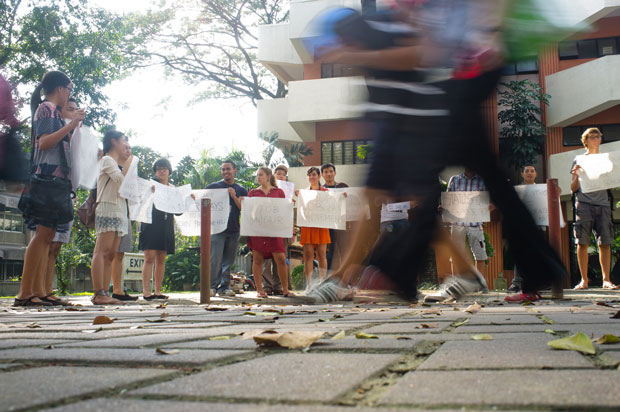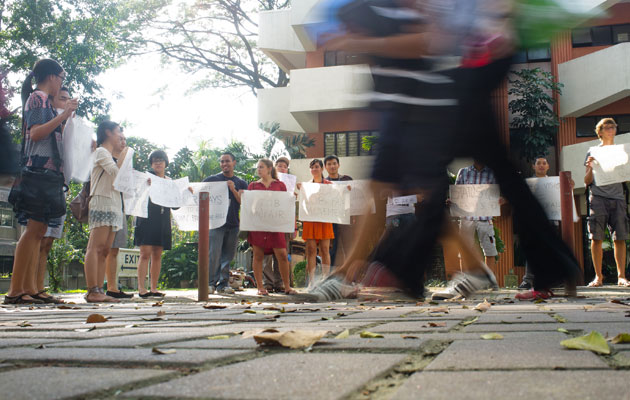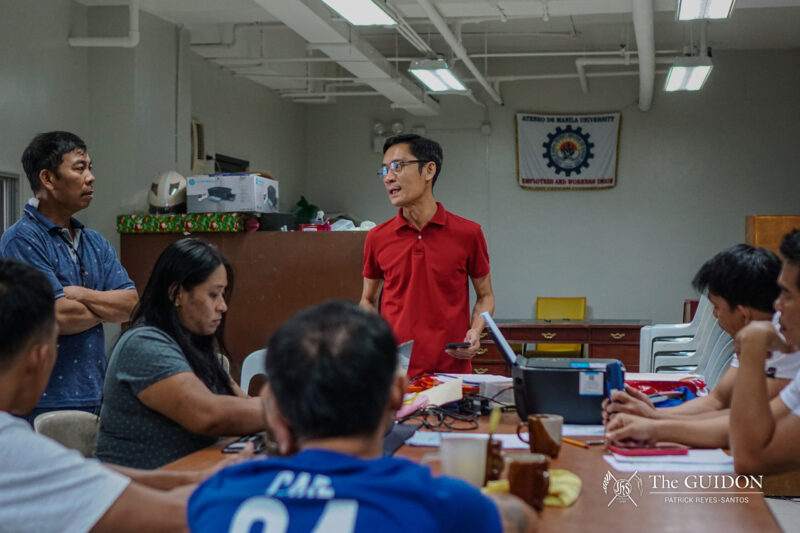
Deafening silence. In the “Occupy Job Fair” effort, silent protesters express their dissatisfaction towards the job fair. Photo by Joseph S. Angan
AFTER INTENSE debates over the Ateneo Placement Office (APO)’s alleged bias for the School of Management (SOM) during the annual APO Job Fair, administrators and concerned students sat down in a public forum held at the MVP Basement last January 20.
The dialogue, which lasted an hour and a half, was organized after several students expressed their intention to stage a silent protest against the weeklong fair, held from January 16 to 20 at the Red Brick Road.
The issue began with a post on the Facebook group Sanggu Bantay Halalan from Ateneo Debate Society President and Communication senior Job de Leon. In his post, he lamented the lack of options for non-management students, noting that most of the fair participants were multinational corporations.
The issue quickly branched out into broader topics, with some claiming that the university was promoting “SOM-centrism,” while others said that APO cannot be blamed as the job fair and the availability of careers only reflected the “real world.” Students were divided, with some acknowledging de Leon’s concerns as valid while others called him and his supporters “spoiled brats” for considering the job fair a right instead of a privilege.
Last January 19, de Leon and The Assembly President Steffi Sales posted calls for a silent protest, fashioned after the popular Occupy movement, to be staged the next day at the Red Brick Road. Following this announcement, School of Humanities (SOH) 4th Year Executive Officer Jenica Dizon announced that APO Director Carla Siojo and several other administrators were open to a dialogue with concerned students at the same time as the rally.
More than 15 people marched across the Red Brick road at 2:30 PM, holding placards with slogans such as “Job (un)fair,” and “Occupy! Because down the hill is not just corporate,” and “Status quo, the way to go?” After the protest, concerned students gathered in MVP basement to dialogue with administrators, which included Vice President for the Loyola Schools John Paul Vergara, Associate Dean for Student Affairs Rene San Andres, and Office of Student Activities Director Chris Castillo.
“We want options”
De Leon opened the discussion by refuting all personal attacks, such as those accusing them of being spoiled brats. He also clarified that they have nothing against APO nor the participating companies of the fair.
“The argument is, ‘it’s free, it’s a service, a privilege.’ But in the same line, we think it’s a privilege that should be extended to everyone,” he said. “We don’t want to be spoiled. If some people are given the opportunity to start right here, right now, then that’s an opportunity that we all have to work for to extend for all.”
He added that although they can also apply for non-management positions in the companies, it was simply not in line with what their specific courses require.
“I’d like to think that the Ateneo told us throughout our four years that it’s not just about trying to fit in, but creating space for you to fit,” de Leon said.
“What we’re saying is we want more options. We’re not telling anyone to bring all these institutions here and hire us on the spot. We understand that some institutions don’t really do mass hiring [and] we’re completely fine with that. We just want them to be there, [to] at least validate the choices that we made when we said we wanted to study here.”
APO’s initiatives
Council of Organizations of the Ateneo (COA) President Kenneth Abante affirmed the representation of other sectors through COA cluster heads and secretary treasurers. There have been measures to improve the Ateneo Placement Talks (APEX) series, in which resource persons from different fields—including non-management ones—were invited to talk about their industries.
Abante asked about the process of selecting companies for inclusion in the job fair. APO Director Carla Siojo explained that placement representatives send letters to non-government organizations, schools, government agencies and corporations. Institutions that did not reply were called personally by the office. Despite these efforts, some institutions chose not to participate in the fair.
Siojo said that possible reasons for declining include freeze hiring in the government and the non-availability of positions for NGOs which do not conduct outright hiring.
“In the [APO Job Fair magazine] there were a lot of companies listed. All those companies were invited, but not all responded positively for their own personal reasons, aside from the reasons already mentioned,” she said. “And even if they are not participating in this job fair, [we still post] announcements of vacancies and sending resumes of our students as needed. We still do that as a service as well.”
She added that company representatives accept resumes of all applicants, as they look for values and people skills more than the course, unless the job requires technical expertise.
De Leon, however, thinks that the problem with NGOs may be a chicken-and-egg scenario: since NGOs see that 90 percent of Ateneans typically go to corporations, they do not feel that it is worth it to come for the 10 percent. On the students’ part, the lack of visibility may have generated disinterest.
Solutions, not noise
Management honors senior Peterson Poon questioned the value of the protest during the forum, saying that although the Sanggunian had already scheduled a meeting with administrations 16 hours prior to the silent rally, the students insisted on going on with the protest.
He said that the rally was unnecessary and did not need to use the loaded term “SOM-centrism” to demand discourse.
He also said that the discussion revolved around two things: the nature of the world and what it should be and the nature of the job fair and what it should do to the real world. While he agreed that there is much to change in the ‘real world,’ he said that using the job fair as a “battering ram” to air complaints about ‘capitalism’ was unfair.
Poon said that everyone was equally missing something from the fair.
“I want to work for Apple. Apple is not here. But do you see me complaining?” he asked.
Instead of a protest, dialogue with APO would be more helpful.
But de Leon said that while they are open to collaboration, a protest gets many people involved to talk about the issue, not just those concerned but those who should be concerned.
Meanwhile, Associate Dean for Student Affairs Rene San Andres, said that he was “happy and consoled” to hear that the students are raising the issues themselves. Although he disapproves of combative approaches and instead advocates for “healthy angst,” he said that it prompts a re-examination of current systems and mechanisms to efficiently communicate the students’ needs to the administration.
In a Facebook note de Leon posted a day before the protest, he suggested plans to improve future job fairs. He cited four main points: having school-specific job fairs, consolidating contacts from departments and student organizations, lowering access fees to the fair, and opening miscellaneous booths for companies that can’t send personal representatives to the fair.
Not just about the jobs
Christian Union for Socialist and Democratic Advancement (Crusada) Secretary-General Bian Villanueva hailed the “Occupy Job Fair” movement as a “welcome development” as it shows student awareness on the social and economic situation outside Ateneo. He also acknowledged that APO cannot be entirely to blame for the scarcity of job openings in other non-management fields.
“There is no doubt that [APO has] done [its] utmost in trying to preserve university values in their attempt to make the job fair more equitable,” he said. “The point is however, that the values this university teaches us, and the current situation in which we live cannot decisively match.”
He said that while it is true that there are more job opportunities available for business or technology students, the situation is not examined critically.
“Seldom is the question asked…is it right that we have come to accept this as normal?” Villanueva said. “I am inclined to believe that it isn’t, and the heavy hand of my education in the humanities and the social sciences tells me to believe that something is terribly wrong.”
He added that the current debate has gone beyond the issue of job availability, but about the structural problem that perpetuates the status quo.
“Institutions that replicate and reinforce dominant narratives of systematic exclusion may not necessarily be at direct fault…but without a change in consciousness and awakening to the need for radical change, any marginal attempt to remedy exlcusion can become pointless,” he said.
“Be realistic, demand the impossible. What is real is not necessarily what is right.”
Editor’s Note: Several job fair protesters write for The GUIDON: Luther Aquino is the associate editor of the publication. Job de Leon and Steffi Sales write for the Features and Inquiry section of the paper, respectively.








[…] http://theguidon.com/1112/main/2012/02/students-admin-dialogue-over-job-fair-issue/ […]
[…] http://captainseat.wordpress.com/2012/08/18/interview-documentation/ Share this:TwitterFacebookLike this:LikeBe the first to like this. Posted in ESSAY 2 […]
[…] http://captainseat.wordpress.com/2012/08/18/interview-documentation/ Share this:TwitterFacebookLike this:LikeBe the first to like this. Posted in ESSAY 2 […]